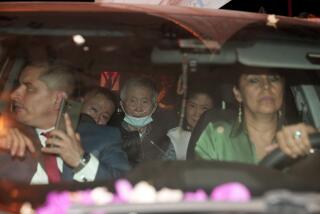PERSPECTIVE ON POLITICS : Peru to Perot: a Suicidal Leap : Electing an outsider may satisfy people’s anger, but a novice makes a poor and potentially dangerous president.
- Share via
What does the United States have in common with Peru?
More than meets the eye.
In spite of their vast differences, both countries share a mood that has already proven in Peru to be very dangerous for democracy: a deep distrust of the political system and institutions and a readiness to do away with career politicians.
In the last presidential election, Peruvians voted overwhelmingly for Alberto Fujimori, a businessman with no experience in politics. His straight talk and no-nonsense attitude inspired the populace, who saw him as the epitome of the “outsider” and the leader who could save them from all other leaders.
Fujimori’s victory stunned the Peruvian political Establishment. If an outsider prevails this year in our country, it won’t be such a surprise. The growing dislike of incumbents and political insiders has produced challengers of a different breed who have given the 1992 presidential campaign a spark that nobody would have predicted five months ago, when the reelection of President Bush seemed to be a boring certainty.
First, it was columnist Pat Buchanan who stole the headlines by challenging his own party’s President. Then Ross Perot descended from his business Olympus and presented himself as an independent to save the nation from inept and corrupt politicians of both parties.
Americans are responding to Perot’s straight talk and no-nonsense attitude with an enthusiasm that is as powerful as it is mindless.
The enthusiasts should take a good look at the recent events in Peru, where Fujimori is showing the world what the lack of political experience could ultimately lead to: the dismantling of representative democracy. Unskilled in dialogue and compromise--proper tools of politics--Fujimori alienated Congress and the political leadership. Then, unable to bend the arms of government to his will, he aligned himself with the only other institution unaccustomed to dialogue: the armed forces. With their support, he staged a “self-coup” that is allowing him the exercise of dictatorial powers.
The historical and structural differences between the United States and Peru render a self-coup almost impossible here. But the lack of governing experience in a millionaire such as Perot, who seems to think that leading the country is the same as managing a business, threatens a far worse leadership gridlock than the one we blame on Washington insiders.
Yes, there is ineptitude and corruption at almost every level of government, but the crisis of leadership is not without a facilitator: the crisis of followership. Both feed on each other. Citizens have become reluctant to invest themselves in our national community; leaders have come to prefer the manipulation of images, rather than debating real issues and ideas. In turn, the absence of thoughtful leadership deepens the citizens’ loss of faith in government institutions and the political process.
Nevertheless, voters should think twice before they choose a President just because he represents a good opportunity to get rid of “insiders.” Improvement of the current political ills will not come about easily or instantly. It requires changes and action at many levels, as well as the participation of each one of us in the process. Above all, it requires an expansion of the national debate, not its shrinking to the untested platitudes of a political novice.
Hoping that an outsider will save us and the nation is a self-delusion. Voting for one will certainly give us the sweet taste of revenge against the insiders we blame for our situation. But it will put our country at risk and us on the road of bitter disappointment. Just ask thoughtful Peruvians.
More to Read
Sign up for Essential California
The most important California stories and recommendations in your inbox every morning.
You may occasionally receive promotional content from the Los Angeles Times.













